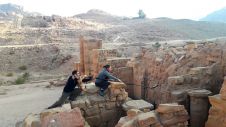The Clock is Ticking
We've come a long way already, but we desperately need to pick up the pace. The cadastre of today needs to be implemented in large parts of the world as soon as possible, in order to avoid hundreds of thousands of people being thrown into poverty for generations to come. Oxfam has published a report, ‘Land and Power', in which it describes how 227 million hectares of land - of which roughly half in Africa and half the other in developing parts of the world lacking cadastral systems - have been sold off, leased or licensed in large-scale deals since 2001. This modern-day ‘land rush' stems from a combination of the increasing demand for food production, massive sown areas for biofuels and sheer land speculation. Oxfam reports that, due to so-called ‘land-grabbers' rights', the needs of people living on the land in question are ignored, leaving them homeless and without any means to grow food for themselves and their livelihoods.
Modern cadastre is the way to give legal property rights to people who are entitled to them but have simply either never had the chance or seen the need to register them. Over recent decades, cadastral organisations in the so-called Western world have been working on digitising information - from paper to digital, from chart to database - resulting in amazing possibilities and transparency. In addition, GPS, satellite imagery and crowdsourcing are making it easier and faster to acquire data than before. Whereas in Europe and other parts of the Western world cadastres evolved over hundreds of years, it is now possible to set up and implement the framework in the space of just a few years.
The International Federation of Land Surveyors, FIG, has adhered to the Millennium Development Goals of the United Nations and has embraced the goal of reducing poverty by half by the year 2015 in particular. FIG regards land registration as the greatest tool it can offer the world population, and it has found many ambassadors for its approach, both from within and beyond the global community of geomatics professionals - not only manufacturers from the field, but also the World Bank and many more.
The Oxfam report on land-grabbing illustrates that the ambassadors must now develop their own role into that of an implementer. Words are no longer enough, we need deeds. The interests of big business, corrupt governments and land speculators are too persistent; rather than evaporating over time, they will only grow bigger. The clock is ticking for countless families on land that they have worked and lived on for years, but never legally owned. The geomatics community can provide the tools and will work on further developing the system to make it even better: that's the community's responsibility. Governments, investors and NGOs, meanwhile, also have to take up their responsibility: to work together at the fastest pace possible in order to implement a system for registering the rights of those many thousands of people, before others can grab them for good.

Value staying current with geomatics?
Stay on the map with our expertly curated newsletters.
We provide educational insights, industry updates, and inspiring stories to help you learn, grow, and reach your full potential in your field. Don't miss out - subscribe today and ensure you're always informed, educated, and inspired.
Choose your newsletter(s)
























